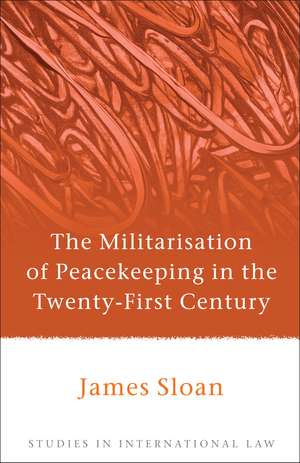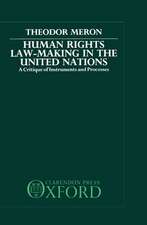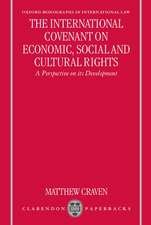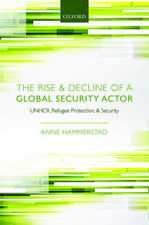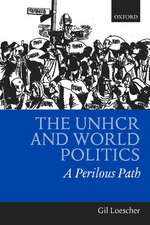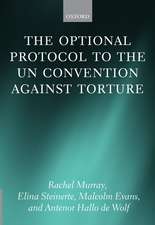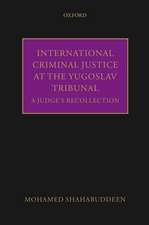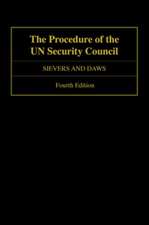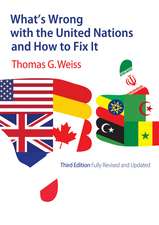The Militarisation of Peacekeeping in the Twenty-First Century: Studies in International Law
Autor James Sloanen Limba Engleză Hardback – 31 oct 2011
Din seria Studies in International Law
- 34%
 Preț: 511.07 lei
Preț: 511.07 lei - 30%
 Preț: 538.77 lei
Preț: 538.77 lei - 23%
 Preț: 249.26 lei
Preț: 249.26 lei - 34%
 Preț: 512.30 lei
Preț: 512.30 lei - 21%
 Preț: 275.26 lei
Preț: 275.26 lei - 30%
 Preț: 570.51 lei
Preț: 570.51 lei - 30%
 Preț: 571.24 lei
Preț: 571.24 lei - 18%
 Preț: 297.20 lei
Preț: 297.20 lei - 30%
 Preț: 573.05 lei
Preț: 573.05 lei - 30%
 Preț: 1138.79 lei
Preț: 1138.79 lei -
 Preț: 448.39 lei
Preț: 448.39 lei - 30%
 Preț: 571.34 lei
Preț: 571.34 lei - 28%
 Preț: 406.31 lei
Preț: 406.31 lei - 21%
 Preț: 270.97 lei
Preț: 270.97 lei - 30%
 Preț: 570.43 lei
Preț: 570.43 lei - 30%
 Preț: 836.82 lei
Preț: 836.82 lei - 14%
 Preț: 570.43 lei
Preț: 570.43 lei - 30%
 Preț: 512.37 lei
Preț: 512.37 lei - 30%
 Preț: 511.14 lei
Preț: 511.14 lei - 30%
 Preț: 954.11 lei
Preț: 954.11 lei - 30%
 Preț: 572.47 lei
Preț: 572.47 lei - 30%
 Preț: 603.73 lei
Preț: 603.73 lei - 30%
 Preț: 779.50 lei
Preț: 779.50 lei - 14%
 Preț: 837.54 lei
Preț: 837.54 lei - 30%
 Preț: 898.78 lei
Preț: 898.78 lei - 30%
 Preț: 576.40 lei
Preț: 576.40 lei - 30%
 Preț: 719.91 lei
Preț: 719.91 lei - 30%
 Preț: 599.66 lei
Preț: 599.66 lei - 12%
 Preț: 233.46 lei
Preț: 233.46 lei - 30%
 Preț: 779.50 lei
Preț: 779.50 lei - 30%
 Preț: 570.43 lei
Preț: 570.43 lei - 14%
 Preț: 779.09 lei
Preț: 779.09 lei - 30%
 Preț: 540.38 lei
Preț: 540.38 lei - 30%
 Preț: 573.86 lei
Preț: 573.86 lei - 14%
 Preț: 574.92 lei
Preț: 574.92 lei - 28%
 Preț: 500.25 lei
Preț: 500.25 lei - 30%
 Preț: 542.02 lei
Preț: 542.02 lei - 30%
 Preț: 778.12 lei
Preț: 778.12 lei - 30%
 Preț: 540.48 lei
Preț: 540.48 lei - 30%
 Preț: 570.43 lei
Preț: 570.43 lei - 30%
 Preț: 515.24 lei
Preț: 515.24 lei - 30%
 Preț: 573.70 lei
Preț: 573.70 lei - 30%
 Preț: 720.23 lei
Preț: 720.23 lei - 30%
 Preț: 784.00 lei
Preț: 784.00 lei - 22%
 Preț: 571.24 lei
Preț: 571.24 lei - 14%
 Preț: 779.09 lei
Preț: 779.09 lei - 30%
 Preț: 779.91 lei
Preț: 779.91 lei
Preț: 598.45 lei
Preț vechi: 858.60 lei
-30% Nou
Puncte Express: 898
Preț estimativ în valută:
114.51€ • 119.57$ • 94.56£
114.51€ • 119.57$ • 94.56£
Carte disponibilă
Livrare economică 25 martie-08 aprilie
Preluare comenzi: 021 569.72.76
Specificații
ISBN-13: 9781849461146
ISBN-10: 1849461147
Pagini: 336
Dimensiuni: 156 x 234 x 22 mm
Greutate: 0.52 kg
Ediția:New.
Editura: Bloomsbury Publishing
Colecția Hart Publishing
Seria Studies in International Law
Locul publicării:London, United Kingdom
ISBN-10: 1849461147
Pagini: 336
Dimensiuni: 156 x 234 x 22 mm
Greutate: 0.52 kg
Ediția:New.
Editura: Bloomsbury Publishing
Colecția Hart Publishing
Seria Studies in International Law
Locul publicării:London, United Kingdom
Caracteristici
A close examination and analysis of the peace-keeping operations in a variety of countries.The author argues that, for the most part, the operations in place are fundamentally ill-suited to the enforcement-type tasks being asked of them. This book fills a gap in the existing literature by considering the issue of the blurring of the lines between peacekeeping and enforcement.Will be of interest to scholars of both peacekeeping and the law of the use of force.
Notă biografică
James Sloan is a Lecturer in International Law at the University of Glasgow, School of Law.
Cuprins
1 Introduction 1. The Changed Nature of Peacekeeping 2. Militarised Peacekeeping: Slouching Towards Crisis 3. Structure of the Book 4. The Definition of Peacekeeping 2 Peacekeeping: The Opposite of Enforcement? 1. Introduction 2. The Changed Nature of Peacekeeping 3. The Changed Nature of Enforcement 4. The Changed Nature of Peace-Enforcement 5. Conclusion3 The Peacekeeping Powers of the Security Council and the Limitations Thereupon1. Introduction2. Purposes and Principles of the UN3. Security Council Powers 4. Implied Security Council Powers 5. Overall Conclusions on the Security Council's Legal Powers/Constraints 4 When Peacekeeping and Enforcement Overlap: Twentieth Century Practice 1. Introduction 2. UNEF I (November 1956-June 1967) 3. ONUC (July 1960-June 1964) 4. Missions in the Mid-1990s 5. Conclusions 5 When Peacekeeping and Enforcement Overlap: Twenty-First Century Practice - The Early Operations 1. Introduction 2. Sierra Leone (October 1999-December 2005) 3. East Timor (October 1999-May 2002 and May 2002-May 2005) 4. Democratic Republic of the Congo (November 1999-30 June 2010 and July 1 2010-Present) 6 When Peacekeeping and Enforcement Overlap: Twenty-First Century Practice - The Later Operations 1. Introduction 2. Liberia (September 2003-present) 3. Côte D'Ivoire (April 2004-Present) 4. Haiti (April 2004-Present) 5. Burundi (June 2004-December 2006) 6. Sudan (March 2005-Present) 7. Central African Republic and Chad (September 2007-December 2010) 7 Conclusions 1. Introduction 2. Overview of the Problems 3. Legal Conclusions 4. Final Remarks: The Way Forward Index
Descriere
UN peacekeeping operations, long expected to use force only in self-defence and to act impartially, are now being relied upon as a means to maintain and restore security. Through a close examination of 21st century peacekeeping operations the book shows that they are fundamentally ill-suited to the enforcement-type tasks being asked of them.
